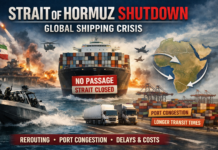
The International Transport Workers’ Federation (ITF) condemned Shipping Australia Limited (SAL) for its persistent opposition to the Australian government’s proposal to create a strategic fleet of Australian-flagged vessels.
“SAL, which represents major international shipping lines – including Evergreen, MSC, K-Line, HMM, CMA CGM, Maersk and Hapag-Lloyd – seems to be more concerned with the profits of foreign multinationals than with the well-being of Australia’s economy, security, and maritime industry,” stated Chris Given, chair of the ITF’s Cabotage Task Force.
ITF said that SAL’s recent article, drawing a comparison between Australia’s cabotage policies and Chile’s decision to liberalise its maritime sector, is considered misleading.
Chris Given noted, “Maritime cabotage is essential for Australia’s domestic trade, national security, and environmental sustainability. It also creates jobs and develops skills in the maritime sector. SAL’s opposition to a strategic fleet is nothing more than an attempt to protect the interests of its overseas members at the expense of Australia’s national interests.
According to Given, other countries like Thailand and South Africa acknowledge the significance of bolstering national trade through the implementation of national shipping lines for domestic routes.
“In contrast to SAL’s stance, South Africa, like Australia, took proactive measures during the Covid-19 pandemic, acknowledging the vulnerability of their supply chains to disruptions in essential imports and exports. South Africa’s response involved the development of the South African Shipping Company Bill, aimed at creating and managing a strategic fleet of vessels under the South African Ship Register,” claims Given.
He also highlighted that SAL’s resistance to a national fleet stems from a preference to prioritise maximal profits for multinational shipping corporations, rather than promoting a fair playing field that would be advantageous to the Australian economy and its citizens.





